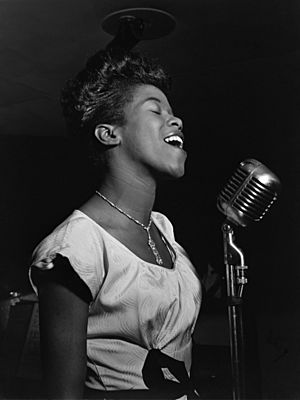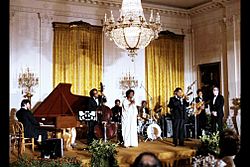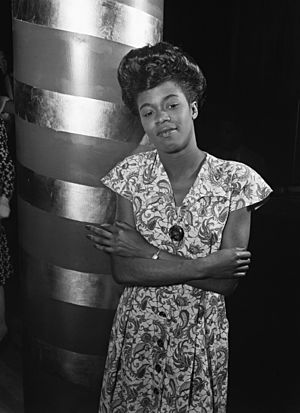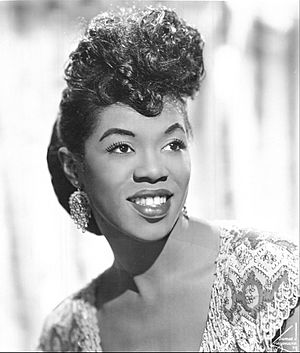Sarah Vaughan facts for kids
Quick facts for kids Sarah Vaughan |
|
|---|---|

Vaughan, c. 1946
|
|
| Background information | |
| Birth name | Sarah Lois Vaughan |
| Born | March 27, 1924 Newark, New Jersey, U.S. |
| Died | April 3, 1990 (aged 66) Hidden Hills, California, U.S. |
| Genres | |
| Occupation(s) | Singer |
| Instruments | Vocals, piano |
| Years active | 1942–1990 |
| Labels | Columbia, Mercury, Verve, Roulette, Pablo |
Sarah Lois Vaughan (born March 27, 1924 – died April 3, 1990) was an American jazz singer. She was known for her amazing voice and unique style.
People called her "Sassy" and "The Divine One." She won two Grammy Awards, including a special Lifetime Achievement Award. Many critics say she had one of the best voices of the 20th century.
Contents
Sarah Vaughan's Early Life
Sarah Vaughan was born in Newark, New Jersey. Her father, Asbury "Jake" Vaughan, was a carpenter who played guitar and piano. Her mother, Ada Vaughan, was a laundress and sang in the church choir.
The Vaughan family was very active at New Mount Zion Baptist Church. Sarah started piano lessons when she was seven. She also sang in the church choir and played piano for church services.
Discovering Music
Sarah loved popular music from records and the radio. In the 1930s, she often watched local bands perform. As a teenager, she began performing as a pianist and singer in clubs in Newark.
She went to East Side High School and then Newark Arts High School. But her love for music led her to leave high school early to focus on her singing.
Sarah Vaughan's Music Career
Starting Her Journey: 1942-1944
In 1942, when Sarah was 18, she went to the Apollo Theater in New York City. She competed in their Amateur Night contest as a singer. She sang "Body and Soul" and won! Her prize was $10 and a chance to perform at the Apollo for a week.
On November 20, 1942, she opened for the famous singer Ella Fitzgerald at the Apollo.
Joining Big Bands
During her Apollo performances, Sarah met bandleader Earl Hines. He hired her to sing with his big band in April 1943. The Earl Hines band was very important in jazz history. It included future jazz stars like Dizzy Gillespie and Charlie Parker.
In 1944, Sarah joined Billy Eckstine's band. This gave her her first chance to record music. She recorded "I'll Wait and Pray" in December 1944. Soon after, she decided to start her own solo career.
Pianist John Malachi gave Sarah the nickname "Sassy." She liked it, and the name stuck with her friends and in the news.
Becoming a Solo Star: 1945-1953
Sarah began her solo career in 1945. She performed in many famous jazz clubs in New York City. She recorded "Lover Man" with Dizzy Gillespie and Charlie Parker.
She signed a contract with Musicraft Records in 1946. Her recordings for Musicraft included popular songs like "If You Could See Me Now" and "Tenderly". "Tenderly" became a surprise hit in 1947.
Columbia Records and More Success
In 1948, Sarah signed with Columbia Records, a larger music company. She continued to have hit songs like "Black Coffee" in 1949. During her time at Columbia, she mostly recorded popular ballads.
She won awards from Down Beat and Metronome magazines for several years. Her success led to many performances in clubs across the country. In 1949, she sang with a symphony orchestra for the first time. A Chicago radio DJ gave her another nickname, "The Divine One."
Mercury Records and Touring: 1954-1959
In 1953, Sarah signed with Mercury Records. She recorded popular songs for Mercury and jazz songs for its special jazz label, EmArcy. Her first hit with Mercury was "Make Yourself Comfortable" in 1954.
Her biggest commercial success came in 1959 with "Broken Hearted Melody." She thought the song was "corny," but it became her first gold record. She also recorded duets with Billy Eckstine, including the hit "Passing Strangers."
Sarah toured almost constantly in the late 1950s. She performed at the first Newport Jazz Festival in 1954. She also sang at Carnegie Hall with the Count Basie Orchestra.
New Directions: 1959-1969
After her contract with Mercury ended, Sarah signed with Roulette Records in 1960. She recorded many albums with large orchestras. She also made more intimate jazz albums, like After Hours (1961).
In 1961, Sarah adopted a daughter named Deborah Lois Atkins, who later became known as Paris Vaughan.
She returned to Mercury Records in 1963. In 1963, she recorded a live album in Denmark called Sassy Swings the Tivoli. The next year, she performed at the White House for President Lyndon B. Johnson.
Later Career and Awards: 1970-1989

In 1971, Sarah signed with Mainstream Records. She recorded albums that mixed jazz with pop music. One album, Sarah Vaughan with Michel Legrand, featured songs by the famous composer Michel Legrand.
She also recorded a version of "Rainy Days and Mondays" by The Carpenters. Her song "Send in the Clowns" became one of her most famous songs.
In 1974, she performed music by George Gershwin with the Los Angeles Philharmonic orchestra. She repeated this performance with other symphony orchestras.
Brazilian Music and Grammy Nominations
In 1977, Sarah toured South America and fell in love with Brazil. She decided to record an album of Brazilian music called I Love Brazil!. She worked with famous Brazilian musicians like Milton Nascimento and Antônio Carlos Jobim.
She then signed with Pablo Records, run by Norman Granz. Her album How Long Has This Been Going On? (1978) was nominated for a Grammy Award. I Love Brazil! was also nominated for a Grammy.
Final Achievements
In 1981, Sarah won an Emmy Award for a TV broadcast of her Gershwin performance. In 1982, her album Gershwin Live! won a Grammy for Best Jazz Vocal Performance, Female.
Her final album was Brazilian Romance, released in 1987. In 1989, she sang a short duet with Ella Fitzgerald on Quincy Jones' album Back on the Block. This was her only studio recording with Fitzgerald.
She also appeared in several videos, including Sarah Vaughan Live from Monterey and Sass and Brass.
Sarah Vaughan's Passing
In 1989, Sarah Vaughan's health began to get worse. She had to cancel some performances in Europe. She was diagnosed with lung cancer and was too ill to finish her last shows.
Sarah returned to her home in California. She passed away on April 3, 1990, at the age of 66. Her funeral was held at Mount Zion Baptist Church in Newark, New Jersey. She was buried in Glendale Cemetery, Bloomfield.
Personal Life
Sarah Vaughan was married three times. She adopted a baby girl, Debra Lois, in 1961. Debra later became an actress known as Paris Vaughan.
Awards and Honors
Sarah Vaughan received many awards and honors throughout her life:
- Her album Sarah Vaughan with Clifford Brown and the song "If You Could See Me Now" were added to the Grammy Hall of Fame.
- In 1985, she received a star on the Hollywood Walk of Fame.
- In 1988, she was inducted into the American Jazz Hall of Fame.
- She received an Honorary Doctorate of Music from Berklee College of Music in 1978.
- In 2012, she was inducted into the New Jersey Hall of Fame.
- Parts of the Newark Light Rail stations in New Jersey feature lyrics from her song "Body and Soul."
- She received the George and Ira Gershwin Award for Lifetime Musical Achievement.
- In 2003, San Francisco and Berkeley, California, declared March 27 as Sarah Lois Vaughan Day.
Discography
Filmography
- Disc Jockey (1951)
- Murder, Inc. (1960)
- Schlager-Raketen (1960)
Images for kids
See also
 In Spanish: Sarah Vaughan para niños
In Spanish: Sarah Vaughan para niños





